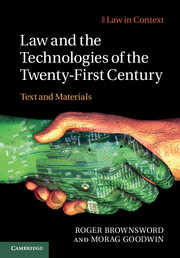Book contents
- Frontmatter
- Contents
- Acknowledgements
- Miscellaneous Frontmatter
- Abbreviations
- Table of cases
- Table of statutes and other public documents
- Part I General introduction
- Part II Regulatory prudence and precaution
- Part III Regulatory legitimacy
- 8 Key boundary-marking concepts
- 9 Human rights as boundary markers
- 10 A look at procedural legitimacy: the role of public participation in technology regulation
- Part IV Regulatory effectiveness
- Part V Regulatory connection
- Concluding overview
- 17 From law to code: the surveillance society and Marper revisited
- Index
- References
17 - From law to code: the surveillance society and Marper revisited
from Concluding overview
Published online by Cambridge University Press: 05 August 2012
- Frontmatter
- Contents
- Acknowledgements
- Miscellaneous Frontmatter
- Abbreviations
- Table of cases
- Table of statutes and other public documents
- Part I General introduction
- Part II Regulatory prudence and precaution
- Part III Regulatory legitimacy
- 8 Key boundary-marking concepts
- 9 Human rights as boundary markers
- 10 A look at procedural legitimacy: the role of public participation in technology regulation
- Part IV Regulatory effectiveness
- Part V Regulatory connection
- Concluding overview
- 17 From law to code: the surveillance society and Marper revisited
- Index
- References
Summary
Introduction
In Chapter 4, we reviewed the Case of S. and Marper v. The United Kingdom, the leading case in Europe on the taking (and retention) of DNA samples and the banking of DNA profiles for criminal justice purposes. The main point at issue, it will be recalled, was whether the authorising legislative provisions were compatible with the UK’s Convention commitments, particularly whether they were compatible with the privacy right protected under Article 8 of the ECHR. The view of the Grand Chamber in Strasbourg was that the legal provisions were far too wide and disproportionate in their impact on privacy. But, this, of course, was not the end of the matter. How did the UK react to the Strasbourg ruling?
The story after Marper can be told quite shortly. Predictably, the Labour administration did not welcome this setback to what it regarded as its flagship criminal justice strategy and it made little secret that it would not rush to implement the Strasbourg ruling. Moreover, there were indications that, when UK law was revised, it would be with a view to adopting no more than a minimally compliant position. There was a period of consultation before proposals (including, perhaps surprisingly, the destruction of all samples that were taken from persons who were not convicted) were published. However, before the new legislative provisions were put into effect, there was a general election, following which a new (Conservative–Liberal Democrat) coalition government took office. The new administration took a rather different view to its predecessor, announcing that it would fully implement the Strasbourg ruling. At the same time, it declared that it would address concerns about the spread of CCTV surveillance. These significant attempts to control the tide of regulatory technologies are set out in the coalition’s Protection of Freedoms Act 2012.
- Type
- Chapter
- Information
- Law and the Technologies of the Twenty-First CenturyText and Materials, pp. 423 - 452Publisher: Cambridge University PressPrint publication year: 2012



